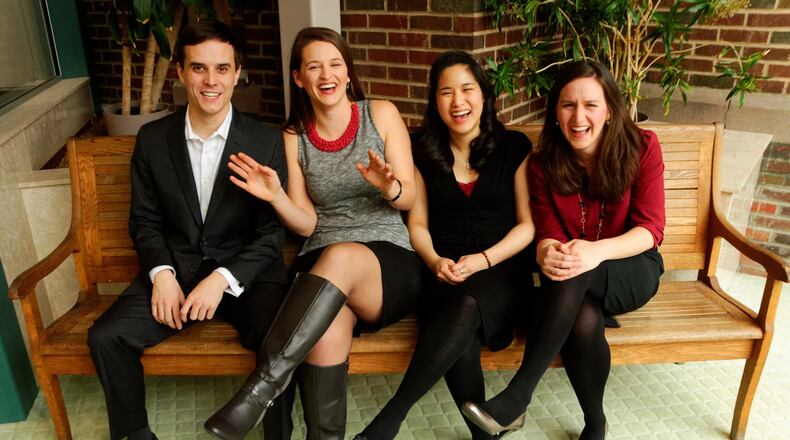Through Lynx Project’s Autism Advocacy Project, four young autistic authors were paired with composers, who are setting their lyrics to music. Heritage Elementary School sixth-grader Rithik Sinhasan is one of the featured students.
Moore co-directs Lynx Project with Caitleen Kahn. The other members are tenor Steven Humes and pianist Florence Mak. The four met while pursuing post-graduate studies at Eastman School of Music and formed Lynx Project out of a “shared desire to revitalize the genre of art song, communicate intimately with audiences and to strengthen community ties through the power of the arts,” she said.
Moore graduated from Lakota in 2008, earned her bachelors and master’s degrees in vocal performance and is now an emerging professional opera singer. She tells more:
Q: What is the Lynx Project?
A: Lynx Project is a nonprofit arts initiative whose mission is to connect performers and audiences through the communicative power of art song and to strengthen community bonds by providing a platform for every voice.
Art song is a little-known gem in the genres of classical music. On average, an art song lasts about three minutes and usually is performed by one singer and one pianist. In art song, a composer sets to music the text of a poem or piece of prose which greatly inspires him or her. Art song is a musical celebration of the power of the written word.
Q: What is the 2017 Autism Advocacy Project?
A: This project involves four individuals in the Cincinnati area, ranging from ages 12-17, who have autism and are nonverbal. They have learned to communicate through a methodology called the Rapid Prompting Method (RPM), in which they point to letters on an alphabet board to spell out their thoughts.
Lynx Project commissioned poetry and prose from these four young men, and a group of professional composers will be setting their words to music in brand new art song.
Lynx Project believes that all voices should be heard. We are eager to help the voices of individuals with non-verbal autism to be heard, as well as to provide an opportunity for contemporary composers to express their musical voice. In doing this, our aim is not only to share beautiful and powerful music, but to raise awareness of autism and help to fight the stigmas that surround it.
Q: How did you find the children and composers you paired with them?
A: My sister, Katie McGill, is a special educator in the Cincinnati area. Through Katie's work with individuals with autism, my eyes were opened to the incredible abilities of these individuals.
I got to know 17-year old Ryan Harris when Katie told me what he had letter-boarded in response to a prompt about a dream or hope for the future. Ryan said, “I want to see the world not by the whole, but by the all too beautiful small things.” I began to think his words would inspire beautiful art song.
In my incredible colleagues at Lynx Project, I found people who shared my dream of advocating for those whose voices need a little amplification, and who were eager to take on a project to help abolish the stigmas surrounding autism and perceived disability.
Through both Katie and Ryan’s family, Lynx Project was able to recruit three more individuals to contribute texts to our project. Then, through various connections in our musical communities, we commissioned five composers who were inspired to set their texts to music.
Q: What impact do you hope these art songs will have?
A: In the past, I would have been inclined to assume that if an individual was not able to speak clearly, they must not be able to think clearly. Looking back, this mortifies me! It is mine and my colleagues' hope that these songs will have a long life, be performed throughout the nation and even the world, and help educate others about autism and perceived disability who may need it as much as I did.
As my co-direcotor Caitleen Kahn likes to say, “Art alone cannot change the world, but art can create conversations — and conversations can change the world.”
It is Lynx Project’s hope that this project will start a conversation about autism, about acceptance and about the universality of the human condition in a way that will, slowly but surely, help transform the world.
For more information, go online to www.lynxproject.org or email contact@lynxproject.org.
Contact this contributing writer at lisa.knodel@gmail.com.
About the Author
